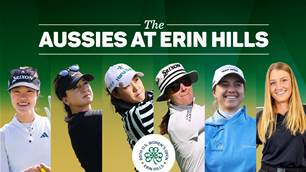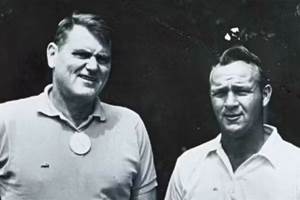Minjee Lee won her third major championship in June, the news making a ripple in the sports pages of our mainstream press before being quickly subsumed by the money-makers of our national sports consciousness. Some will blame the media, some will blame misogyny, some will blame the weight of history. Matt Cleary argues that women's golf needs a champion who champions women's golf.
When Min Woo Lee won the U.S PGA Championship at Quail Hollow in May, leaving him with two majors to complete a career grand slam and place him in the pantheon with Gary Player, Rory McIlroy and Eldrick Tont “Tiger” Woods, among other global golf elites, it sparked a frenzy of press in Australia. The triumph led news bulletins, dominated sports pages and bubbled about digital media like viral champagne ejaculate.
“The Chef” had already arrived, of course, was well beyond our Next Big Thing. But when he hefted that mighty Wanamaker Trophy, it took his profile from Elite Golf Man to Global Superstar, a good-looking and charismatic Australian out there on the Big Stage doing Big Golf Things. And all before age 30. Move over, Smiffy.
Of course, none of that happened.
Rather it was said Chef's sister, Minjee Lee, who won the KPMG Women’s PGA Championship by three strokes at Fields Ranch East in Texas in June, to add to the majors she won in 2021 (Evian Championship) and 2022 (U.S Open).
However, rather than appearing on national news bulletins with live crosses via satellite from the celebrations in Frisco’s famous Concrete Cowboy bar, and so on, the news of Ms Lee’s major championship victory was chronicled six pages back in the sports section of The West Australian, her home-town newspaper in Perth.
Our magazine covered it, of course, and so did the other ones. Fox Sports News gave it some glow. The major papers ran it in print and digitally. And the digital media teams of Golf Australia, the PGA of Australia and WPGA threw out all manner of burley into the greater media ecosystem.
🏌️♀️ Relive Minjee Lee’s historic Women’s PGA Championship win with our exclusive photo gallery 📸Getty Images. https://t.co/mOe7cVx2By pic.twitter.com/f8A1nigP6c
And, maybe two days later, it was effectively forgotten, at least in what we call “mainstream” sports media in Australia, as news of State of Origin selections, Test cricket against South Africa (at Lords, in June) and the injury list of the West Coast Eagles (currently last with one win in 16 games) resumed dominance of our national sports consciousness.
And, of course, it’s more than a bit of a shame that Lee's mighty feat would not be acclaimed as much as you would hope it should be.
So, why is it?
Many will blame “the media”. It’s easy and gratifying to pile on and shoot the messenger for perceived shabby messaging. But it's a cop-out. Because know this: the people who pull the levers of what constitutes mainstream media know what rates, what sells, what their consumers consume. And, sad to say, it is not women’s professional golf, no matter what the local Aussie girl done good has gone and up and done.
Commercial realities mean you can’t put cart before horse. You can’t blame media for making commercial decisions about what to put in their media. Editors, producers, executive producers, these people have been around long enough - and have access to instant digital analytics - to know what their public is interested in (which is different from the Fourth Estate’s role to act in the public interest, another column for another time).
Women's golf is niche within a niche.
Some would blame misogyny. And there is an element of that in the hearts of a small minority of Australian sports fans who see women’s golf as second grade, second rate, because women don’t hit the ball the prodigious distances of their male counterparts, and because they were brushed by Kylie McDaniels at the Blue Light Disco in 1986.
To those people we offer pity, and scorn, and a pox upon them, for it’s an attitude that’s small and mean and dim and dumb. If you can’t appreciate the ball-striking and touch of the elite female players of our game, you’re missing out, and should have a look at yourselves, you poor dumb bastards, and so on.
History? A factor. The men’s Open Championship has been going 153 years. The Women's Open has been a major since 2001. The other three men's majors have been considered majors for over 60 years after Arnold Palmer and his personal propagandist, the journalist Bob Drum, decided, over gin-and-tonics on the jumbo jet to St Andrews in 1960, that the men's “grand slam” tournaments should be what they are today.
Women’s professional golf, for manifold reasons – yes, including the long-entrenched sexism, elitism and stuffiness of “golf” - has been a slower burner, certainly slower than its closest counterpart, tennis, which is governed by a federation which dictates equality of pay and prestige, unlike golf which is governed by several un-equal branches of self-interested authority.
Women's golf today has majors named after Chevron and Evian. There's the KPMG PGA Championship and the AIG Women's Open. With the U.S Women's Open brought to you by Ally, whatever that is, it brings the number to five, an odd (and odd) number. All of it denudes the status of women's major golf, a whole other column.
There is also this: women’s golf in Australia doesn’t have an Ash Barty, an Ellyse Perry, an Alyssa Healy, a Sam Kerr or a Mary Fowler, much less a Cathy Freeman or a Dawn Fraser.

Karrie Webb won seven major championships but was never that It Girl, if you will. It’s never really been in her makeup, just as it doesn’t seem to be in the makeup of our current claque of world-class players – Lee, Hannah Green, Steph Kyriacou, Grace Kim, you'd be leaving out Gabi Ruffels, Hira Naveed. It doesn't seem to be in them to be that person. The figurehead. The personification of why golf is cool and why you should play it and consume it, and enjoy the glory of their success.
Sure, they don’t have to be. They don’t owe media or the people who watch it anything. And all those folks are decent, honourable, humble, likeable types who are flat-out outstanding at golf. And good luck to them.
But we don't know them. They don't sell us themselves nor their sport, on or off the course. Maybe it's shyness. Maybe it's humility. Maybe they're just not that exhuberent.
It would be good, though, if someone, one day, revealed a bit about themselves, gave us a glimpse of their personality, and gave the greater Australian sports consumer an idea what they’re like and a reason to like them.
And then, next time one of them wins a major, said sports fan could cheer on the person whom they think they know a bit, as well as the one representing Australia. And it might feel like they've won a major, too.
As any couch-bound slob who enjoyed Ash Barty winning Wimbledon would tell you.
Related Articles

'Crazy': Green in seventh heaven after latest LPGA win

The Aussies at the U.S Women’s Open















